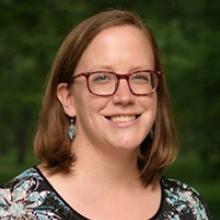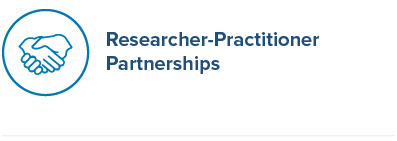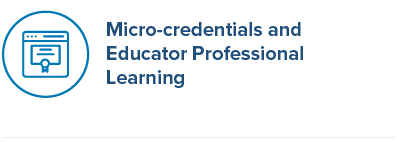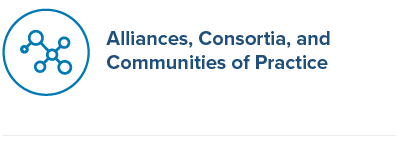Researcher-Practitioner Partnerships | CS@AIR
Staff across AIR are experienced in facilitating and evaluating Researcher-Practitioner Partnerships (RPPs). RPPs are emerging approaches in which researchers and practitioners (such as teachers, counselors, or school administrators) work as equal partners to address complex and persistent problems of practice in the field; RPPs in particular have become very popular because of the National Science Foundation’s CSforAll: Research and RPPs program.
At CS@AIR, we use RPPs to partner with districts and states to advance their efforts in CS education. Our partnerships may center on a particular grade band or span across PK-12 and vary in focus from teacher professional development to classroom implementation to systems level change and policy explorations. While AIR leads or serves as the research partner for several CS-related RPPs, we can also serve as evaluators of RPPs.
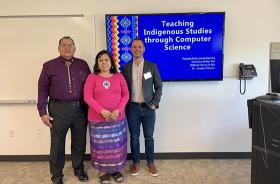
Wind River Elementary Computer Science Collaborative
AIR partnered with three school districts on the Wind River Reservation, the Wyoming Department of Education, and BootUp Professional Development to create culturally relevant computer science education opportunities for Indigenous students, specifically the Eastern Shoshone and Northern Arapaho students on the Wind River Reservation.
Supporting Computing Access, Leadership, and Equity in California (SCALE-CA)
SCALE-CA aims to ensure equitable, scalable, and sustainable implementation of computer science education across California. SCALE-CA focuses on interlocking systemwide interventions at the classroom, district, and state levels: classroom-level professional development for teachers; district/county-level capacity-building for school, district, and local education agency leaders; and state-level activities that inform policymakers. For this NSF-funded project, AIR is a subcontractor and partner to UCLA and works with 16 California districts and county offices of education.

Southern Oregon Computer Science for All (SOCSforAll)
This partnership with Southern Oregon University and Ashland and Talent-Phoenix school districts aims to improve computational thinking in elementary school classrooms and access to this instruction for Hispanic students. The project provides professional development and support for elementary school teachers to integrate computational thinking across subjects and in bilingual classrooms. AIR is the external evaluator and technical assistance partner for this two-year project funded by NSF.
Preparing Urban Milwaukee for Pathways in Computer Science (PUMP-CS)
PUMP-CS is applying a systems change framework to try to understand the conditions that perpetuate K-12 computer science inequities in the district; examining outcomes associated with PUMP-CS professional development and supports; and disseminating which specific strategies reduce inequitable computer science practices in a large urban district. Milwaukee Public Schools, Marquette University, the Learning Partnership, and AIR are collaborating on this project. AIR oversees the systems change research and the evaluation.
Moving Beyond Access, Increasing Teacher Knowledge to Teach Rigorous Equity-Focused High School Computing
Detroit Mercy University, Michigan State University, the Detroit Public Community School District, and industry and community-based organizations are joining together to increase the capacity of underserved high schools to teach the Advanced Placement Computer Science Principles curriculum. The partners also aim to increase underrepresented high school students’ awareness of and interest in computer science as a way to facilitate their paths into related careers. AIR is the formative evaluator of the RPP, providing feedback to RPP leadership on program implementation, the creation of a supportive environment, and effects on school capacity.
Computational Thinking for Educators (CT4EDU)
CT4EDU aims to design, implement, and assess high-quality, integrated curriculum and professional development that support elementary school teachers in embedding computational thinking into their classrooms. A partnership among Michigan State University, Oakland Schools (Michigan), and AIR, this four-year project funded by NSF -identifies problems of practice and points of opportunity in curriculum and teaching practices where computational thinking can intersect with science and mathematics. AIR is the external evaluator.
Building Capacity to Support Elementary CS Pathways Tailored to Rural Needs in Idaho
AIR is partnering with Idaho STEM Action Center and BootUp Professional Development to bring K-5 CS pathways to Idaho’s predominantly rural school districts. The three core partners will work collaboratively to build capacity for developing CS pathways through three key activities:
- Engaging in facilitated RPP meetings structured around co-interpretation of data and regular self-assessment of the partnership;
- Surveying and interviewing elementary school teachers, administrators, and district officials about the current state of K-5 CS education in Idaho, particularly in rural, low-income areas; and
- Hosting CS events in Idaho communities that facilitate exploration of place-based strategies for CS education and CS-related networking opportunities with rural district stakeholders.

